Arizona Diamondbacks Top Five Offseason Priorities

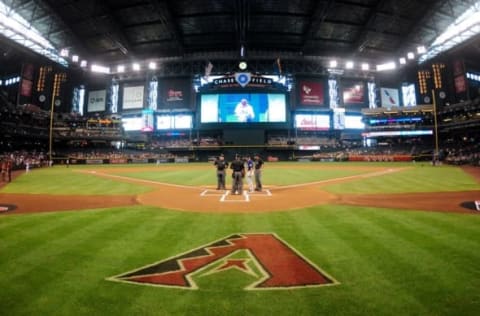
The Arizona Diamondbacks have a busy offseason ahead of them, with questions to answer concerning the front office, the roster, and everything in between. Here are five things they should prioritize during the months ahead.
Earlier today we looked back at the ups and downs (but mostly downs) of the Arizona Diamondbacks‘ 2016 season. Plenty went wrong, from injuries to underperforming players, but there were a few bright spots as well in an otherwise dismal campaign.
The D-Backs find themselves at a crossroads as a franchise heading into the offseason. They will not only have decisions to make regarding how to upgrade their roster in hopes of getting back on track in 2017, but they will also need to put new leadership in place in both the front office and dugout.
If you want to take a glass-half-full approach, it’s fairly clear where the team needs to improve most. Addressing those needs should start moving them in the right direction. The problem is that it will likely be easier said than done. With a relatively small budget, light farm system and unimpressive free agent class looming, the Snakes will be hard-pressed to get the parts they need in the immediate future. Namely, effective pitching.
Becoming a factor in the NL West in 2017 is likely a pipe dream, but the D-Backs can begin laying the foundation for future success over the next few months. A couple big decisions as well as a few small ones could pay significant dividends down the road. Here are five priorities that the organization should keep in mind for the upcoming offseason.
Next: Who's Calling the Shots?
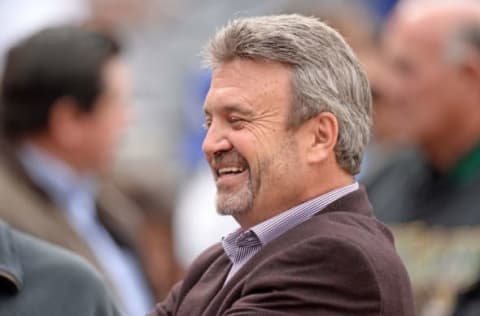
Fill the Front Office and Managerial Vacancies
First things first. Before building their new house, the Diamondbacks need to choose an architect. It wasn’t all that shocking when they let previous general manager Dave Stewart go last week once the regular season drew to a close. Before the important player-personnel decisions are tackled during the offseason, the franchise has to determine who it wants making those decisions. And the sooner, the better.
Several names have already surfaced in the past few days as potential candidates. Nick Cafardo of the Boston Globe identifies the following as possibilities:
Source: Bryan Minniti, Mike Bell, Ray Montgomery, Peter Woodfork and Kim Ng are all in the running for D'Backs GM job.
— Nick Cafardo (@nickcafardo) October 6, 2016
Minniti and Bell are internal candidates, as the D-Backs’ assistant GM and director of player development, respectively. Ng and Woodfork are both senior VPs of baseball operations for MLB, while Montgomery is the Brewers’ VP of amateur scouting. The biggest name that has come up, however, is Dodgers executive Ned Colletti. Unless you count former Blue Jays GM Alex Anthopoulos, who reportedly turned down a chance to interview.
Colletti was L.A.’s general manager from 2005 to 2014 and currently serves as a special adviser to team president Andrew Friedman. The club made the postseason five times during his tenure, including three consecutive NLCS appearances. If Arizona wants someone with a hefty resume, Colletti is definitely the guy out of those already mentioned. However, electing to go with a first-time GM over a retread comes with some appeal, too.
The D-Backs will also need to replace Chip Hale as manager, who was given his walking papers as well last Monday. Bud Black is a recognizable name that’s out there, although fan favorites Mark Grace and Matt Williams are in-house options that seem plausible. But once again, based on how poorly the past season went, you wonder if they would prefer to reach outside the organization for new blood.
They will also have to figure out what exactly happens with Tony La Russa. The franchise is apparently willing to retain him in an adviser capacity, but not as Chief Baseball Officer with all the authority that position entails. Given the occasionally tumultuous nature of his tenure with the club, it would probably be best for the D-Backs if he hit the bricks.
Next: A Little R & R
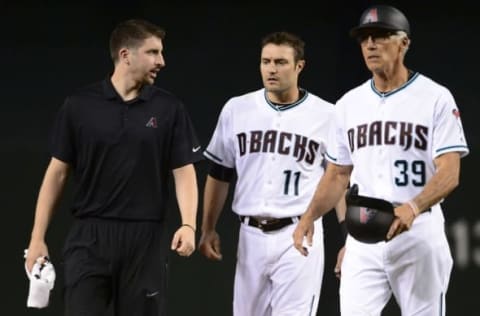
Get Healthy
It’s generally a priority for most teams after a long, grueling season, but for the Diamondbacks it really does apply. They may not have been the most beaten-up team by sheer numbers this year, but they suffered a few vital blows to key players throughout the course of the campaign.
Right off the bat, outfielder A.J. Pollock broke his elbow in an April 1 exhibition game. He underwent surgery and didn’t make his first appearance of the season until August 26. It was a crushing development for the D-Backs after the outfielder’s All-Star breakout campaign of the year prior. In 2015, Pollock slashed .315/.367/.498 with 20 home runs, 76 RBI and 39 stolen bases.
Even after returning, Pollock was bothered by a strained groin that kept him out of some games throughout the month of September. Ultimately, he made it into just 12 contests. The team will need him to fully heal up over the winter and hopefully put in a complete season in 2017. If he can approximate his stellar production of a year ago, it would be a major boost for the squad.
Another big contributor from 2015 who spent much of the past season on the bench was fellow outfielder David Peralta. He put up a .312/.371/.522 slash and led the league with 10 triples last year, but wrist and back problems limited him to 48 games in 2016, during which he posted a .728 OPS.
Arizona’s two major pitching additions faced some health issues as well. Zack Greinke hit the DL in late June with an oblique strain that kept him out until early August. Shelby Miller missed some time in May and June with a right index finger injury. While it’s hard to say how much of either pitcher’s disappointing results this year was due to their injuries (Miller and his 6.15 ERA in particular), they likely didn’t help matters.
If Greinke and Miller recuperate over the winter and pitch like the better versions of themselves next year, it would be a significant relief for the D-Backs.
Next: Resist the Urge
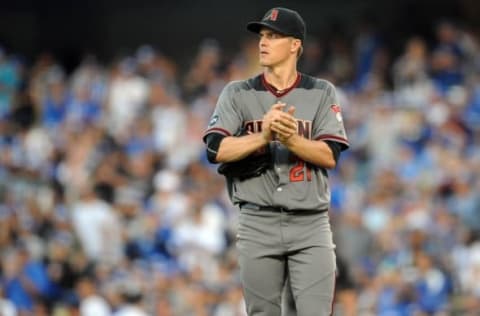
Don’t Trade Greinke or Miller
Staying on the topic of Greinke and Miller, the Diamondbacks should avoiding dealing them during the offseason while their respective values are as low as they’ve ever been. Around this season’s trade deadline, when the team was surely out of the race, rumors began to swirl around both of the D-Backs’ high-profile hurlers. With the organization still in a tough spot, expect to hear their names again in the coming months.
While it might be tempting for a rebuilding team to sell off anything of value for prospects, Arizona would be better off waiting in this situation. With his massive contract, Greinke would be a complicated sell even if he was coming off another Cy Young caliber season. At age 32, teams might be wondering if he is at the start of a decline. The D-Backs would likely have to throw in money on any potential deal, which they would almost certainly be reluctant to do.
For better or worse, the D-Backs made the largest investment in their franchise’s history in Zack Greinke. Year one didn’t quite go as planned, but it’s too early to jump ship. They should cross their fingers that this season was a blip on the radar and that the veteran will settle in more next year. If he does and rebuilds his value a bit, the D-Backs can revisit their trade options.
As for Miller, the only reason someone would want to trade for him now would be to get him dirt cheap and hope that they could fix him. With the right-hander still under contract for a couple more years, the D-Backs may as well hope that they are the team to turn him around.
Next: A Call to Arms
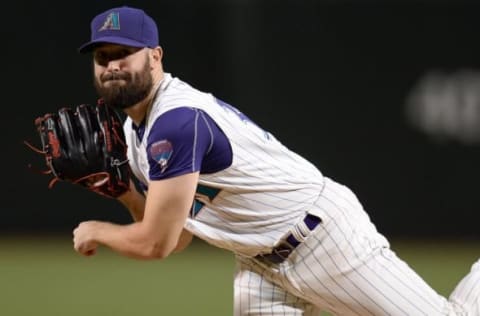
Improve the Pitching Staff
The Diamondbacks’ biggest weakness is undoubtedly their pitching. Overall, D-Backs hurlers were among the worst in the league in all facets of the game. Arizona starters posted a combined 5.19 ERA. Minnesota was the only squad with a worse mark (5.39). The bullpen was just slightly better, managing a 4.94 ERA as a unit, placing them ahead of only Cincinnati (5.09) and Colorado (5.03).
The pitching woes really dragged on the D-Backs’ offense, which was actually fairly productive this season, scoring the 10th most runs in MLB (752) and posting the 11th highest OPS (.752). And that was while missing Pollock for virtually the entire season and Peralta for most of it. Paul Goldschmidt also had somewhat of a down year, although most big leaguers would still have loved to put up his 2016 numbers.
The D-Backs should once again have a competent lineup in 2017, so it will be up to their pitchers to not squander their offensive output. Unfortunately, it will probably be a bit challenging to make any sizable upgrades from outside the organization. The free agent market for starting pitching is startlingly weak, and Arizona isn’t really in a position to overpay for average arms. Some impact names could be available via trade, but they likely don’t have the minor league capital to swing a deal.
Whether or not the D-Backs staff takes a step forward could largely depend on Greinke and Miller rounding back into form. They also have a group of several other young pitchers in the mix, including lefties Robbie Ray and Patrick Corbin, as well as Archie Bradley and Braden Shipley. All are 26 or younger. If they can up their game next year, it would be an additional boost for the staff.
Next: Long-Term Security
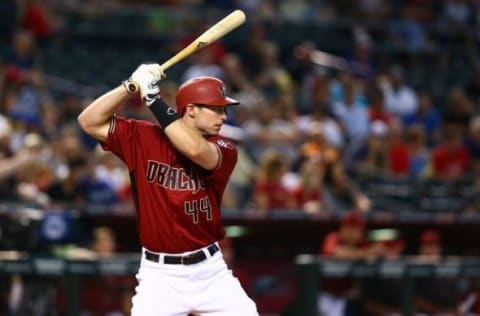
Talk Extensions with Key Players
The D-Backs are one of the league’s lowest-spending teams; even after last winter’s uncharacteristic indulgence on Greinke, they are still ranked 26th in payroll. That’s unlikely to change much, but if Arizona is comfortable with some more expenditures this offseason, they would probably do better by locking up their own core guys than picking from a rather unimpressive free agent class.
More from Call to the Pen
- Philadelphia Phillies, ready for a stretch run, bomb St. Louis Cardinals
- Philadelphia Phillies: The 4 players on the franchise’s Mount Rushmore
- Boston Red Sox fans should be upset over Mookie Betts’ comment
- Analyzing the Boston Red Sox trade for Dave Henderson and Spike Owen
- 2023 MLB postseason likely to have a strange look without Yankees, Red Sox, Cardinals
Paul Goldschmidt is under contract through the 2019 campaign (his age 31 season), but there has been some talk in the past that the D-Backs might be interested in extending him further. Coming off a bit of a down year by his standards, this offseason might not be a bad time to start a dialogue.
Jean Segura made a very convincing argument this year to get paid. After being traded from the Brewers, the second baseman slashed .319/.368/.499 with 20 home runs, 64 RBI and 33 stolen bases in his first season in the desert. He also led the NL with 203 hits. The 26-year-old is currently under team control through 2018. If the D-Backs want to make sure he’s a part of their long-term plans, jumping on him early could be a good idea.
There are other candidates too if Arizona wants to get a bit creative, such as Jake Lamb and Robbie Ray. A.J. Pollock is a possibility as well if the team is confident he’ll stay healthy and return to his 2015 production level for the foreseeable future. Given his injury history, however, that would be a risk.
Next: Athletics Top 5 Offseason Priorities
It’s hard to say the D-Backs are in a great position as a franchise, but they certainly have some very good pieces that could be part of the solution over the next several years. Keeping them signed at an agreeable rate should be a main priority for the organization.